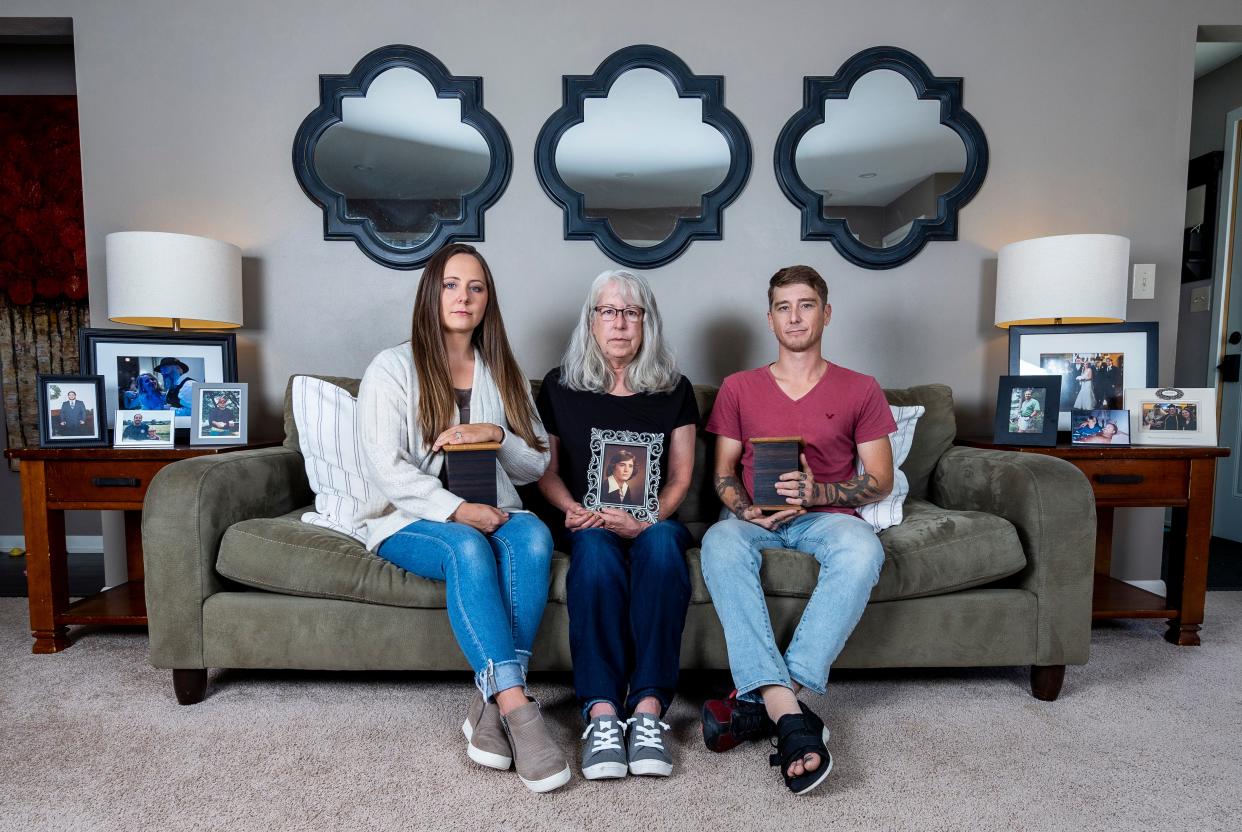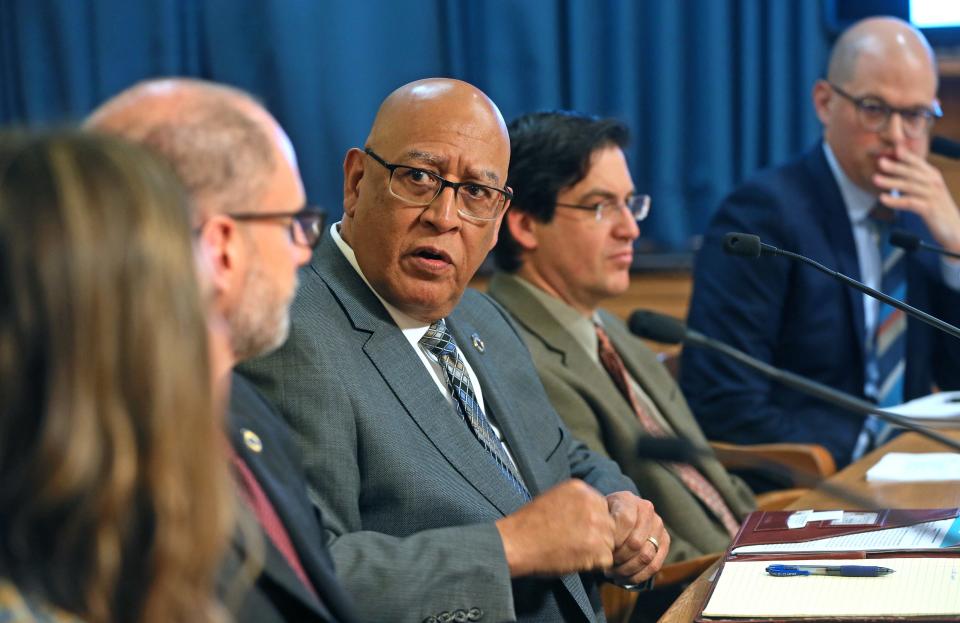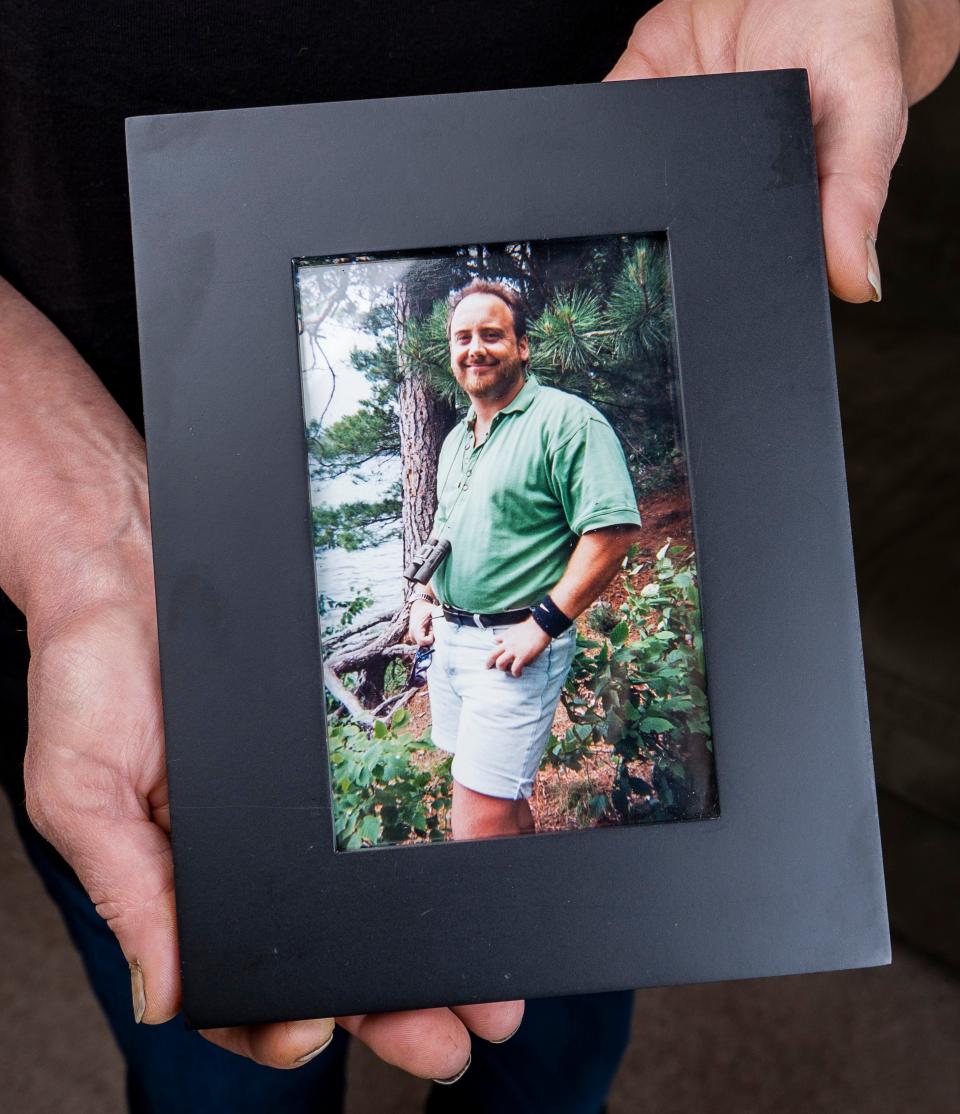In months leading up to Waupun prison suicide, staff failed to give prisoner vital medications, records show

In the two and a half months before Dean Hoffmann died by suicide at Waupun Correctional Institution, staff failed to give him his bipolar and antidepressant medications as prescribed more than three-quarters of the time, records show.
Documents released by the Dodge County Sheriff's Office to Hoffmann's family show frequent inconsistencies in Hoffmann's doses while incarcerated — revelations that led the law enforcement agency to reactivate its investigation last month after putting it on "administrative closure" earlier last year.
Hoffmann, who was 60 years old at the time of his death, had a long documented history of bipolar disorder and suicidal thoughts, according to family members and medical records previously reviewed by the Journal Sentinel. He died by suicide in June, after nine days in solitary confinement.
At the time, he was serving a 28-year sentence for assaulting and tying up his ex-girlfriend in 2018. It was his first criminal charge.
Hoffmann's death was the first at Waupun Correctional Institution — one of the state's five maximum-security prisons — since the facility went on lockdown last year. The Journal Sentinel reported on a second and third death at Waupun in October.
In all three deaths, little information has been released by the Wisconsin Department of Corrections. The two most recent deaths remain under investigation by the Dodge County Medical Examiner.
DOC declined to answer questions about Hoffmann's case, citing health privacy law, but said the agency "will continue to ensure all acute psychological needs of persons in our care ... are addressed in a timely manner". DOC Secretary Kevin A. Carr has declined multiple requests to be interviewed about the state of the agency.
Gov. Tony Evers' spokeswoman, Britt Cudaback, declined to answers questions related to DOC's treatment of Hoffmann and did not respond to a request for an interview.
In a statement, Cudaback pointed out that Evers and his staff have visited the Waupun, Stanley and Green Bay prisons in recent months and periodically meet with prison reform groups like WISDOM.
"Our administration continues our work ensuring the safety of corrections staff and people in DOC care while resuming critical programming," Cudaback said.
In the past, DOC has sidestepped questions about whether lockdown conditions have affected prisoners' mental health or played a factor in recent deaths. The agency has not said whether prisoners under lockdown are allowed the same access to physical and mental health services.
However, Hoffmann's records show that his scheduled psychiatric evaluation was canceled shortly before his death due to the prison being on restricted movement — a lockdown state in correctional facilities where prisoners spend nearly all hours of the day locked in their cells, primarily because of staffing shortages.

Hoffmann's ex-wife, Deborah Hoffmann, and his 36-year-old daughter, Megan Kolb, said they have received few updates from the sheriff's office and the DOC about the status of the investigation.
They have also escalated their concerns, reaching out to Evers and Carr. The latter has come under fire for his handling of the agency during recent crises, including the prison lockdowns and protests over living conditions and lack of access to medical care.
"Missing a day or two of medication is a mistake. Sixty-five days of missed medication — that is not a mistake. That is a pattern," Deborah Hoffmann said.
Hoffmann began missing medication after arrival at Waupun
Dean Hoffmann's health history includes diagnoses of bipolar disorder, depression, hypothyroidism and type II diabetes. He had prescriptions for all of these conditions during his time in prison.
While incarcerated at Dodge Correctional Institution between Feb. 20 and and April 10, he received most of his medications, save for two days. A psychiatric evaluation conducted while he was there indicated Dean Hoffmann was depressed, but not displaying paranoia, experiencing hallucinations or having suicidal thoughts.
Medical staff noted that Dean Hoffmann said he had been taking the antidepressant bupropion for years, and that it was the "only medication that has ever worked for him."
On April 10, Dean Hoffmann was transferred to Waupun Correctional Institution, less than two weeks after the start of the prison's lockdown.
Of the 80 days Dean Hoffmann spent at Waupun, records show he received just 18 days worth of his daily bipolar medication, 37 of his daily antidepressant, four daily doses for hypothyroidism and four for his daily diabetes medication.
Dean Hoffmann was not administered his daily bipolar or depression medication on half the days he was incarcerated at Waupun
Source: Dean Hoffmann's Department of Corrections medical records
Chart by Eva Wen / Milwaukee Journal Sentinel
In the Journal Sentinel's investigation into Dean Hoffmann's death, a prisoner at Waupun said he often overheard him complaining about his medication.
“As usual, they ignored him,” the prisoner said.
In a statement, a DOC spokesperson noted that some medications are administered by staff, while others are supposed to be self-administered by the prisoner.
However, DOC medication administration records show that Dean Hoffmann's antidepressants and bipolar medications were provided by staff, including correctional officers and registered nurses, and not self-administered.
Documents show that he refused his antidepressants and bipolar medication on two days: April 21 and May 4. But on most days, the records either give no indication why the pills were not administered or simply note that they were not given because it was "not appropriate at this time."
"Where are the checks and balances for something that's that important for somebody's life? Just completely mind-blowing," said Kolb, his daughter.

Dr. Terry Kupers, a forensic psychiatrist at the Wright Institute in Berkeley, California, said continuity in taking psychotropic medication is critical. Disruptions can "cause very dangerous side effects," such as severe mood swings, a resurgence of depression, agitation, fatigue, gastrointestinal symptoms, sweating and sleep disorder.
"Suicide crises can follow from exacerbated mood swings or depression, but in many cases it is anxiety and agitation that drive the suicidal behavior. Thus suicide risk is significantly increased for multiple reasons," he said.
On May 18, records show Dean Hoffmann did not receive a psychiatric progress evaluation because Waupun was on restricted movement. He would be "rescheduled as soon as feasible," Waupun medical staff noted.
On June 20, Dean Hoffmann was placed in administrative housing — also known as solitary confinement or segregation — for disobeying orders and refusing to lock up in his cell, records show. The documents note that seven tablets of his bipolar medication, as well as pills for his diabetes and hypothyroidism, were sent to the housing unit.
Nine days later, he was found dead in his cell.
Case remains open as family calls on Evers and Carr for answers
When Deborah Hoffmann was first informed by a Dodge County Sheriff's Office detective that her ex-husband had died, she felt that something was "not right."
"He would not have just decided to do this. He was too excited about things. He was too excited about his appeal," she said.
She began digging through the investigative files released to the family's attorney, Lonnie Story, after the sheriff's office administratively closed its investigation into his death on Aug. 22.
The records confirmed her worst fears — that her ex-husband had not been given his vital medications.
Following the revelation, Deborah Hoffmann and her daughter, Kolb, alerted the sheriff's office of their concerns. In response, the office said a lieutenant had been assigned to review the family's concerns and that the investigation "is now considered active."
Dodge County Sheriff Dale J. Schmidt declined to discuss the case with the Journal Sentinel.
"I started getting a little perturbed at the initial investigation," Deborah Hoffmann said. "It's easy to say 'Closed. It was just a suicide.'"
In a follow-up email with the sheriff's office on Jan. 22, Deborah Hoffmann asked for charges to be filed against the people in charge of caring for her ex-husband. That same day, Schmidt confirmed the investigation remained open but said it would take more time.
"I truly understand your passion in working to get to the bottom of your concerns and we are doing our best to make sure the investigation is done right," Schmidt wrote. "This means we must take the necessary time to be diligent in evaluating the facts before coming to a final conclusion."

Deborah Hoffmann has been periodically reaching out to Evers' office as well as Carr since her ex-husband's death.
"How much more proof of neglect do you need?" Deborah Hoffmann wrote in an email to Carr on Jan. 1.
She said she has not received any response to any of her emails.
Kolb has also been publicly and privately calling attention to the circumstances around his death, speaking at protests and press conferences in recent months.
On Jan. 22, Kolb, along with members of prison reform advocacy group WISDOM, met with the governor's chief of staff, Maggie Gau, and policy director, Katherine Domina.
Kolb said she left the meeting disappointed, feeling like the governor's office offered excuses about staffing shortages and budget restrictions.
"I was so frustrated — just the pure lack of accountability. Nobody is taking accountability for what's going on," she said.
Contact Vanessa Swales at 414-308-5881 or at [email protected]. Follow her on X @Vanessa_Swales.
Milwaukee Journal Sentinel reporter Drake Bentley contributed to this article.
This article originally appeared on Milwaukee Journal Sentinel: Waupun prisoner's suicide records show missed medications for months
